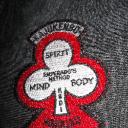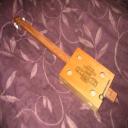Yahoo Answers is shutting down on May 4th, 2021 (Eastern Time) and beginning April 20th, 2021 (Eastern Time) the Yahoo Answers website will be in read-only mode. There will be no changes to other Yahoo properties or services, or your Yahoo account. You can find more information about the Yahoo Answers shutdown and how to download your data on this help page.
Trending News
I asked a question a while ago?
I asked if your martial art was jutsu, or do.
Now I ask the younger bunch, do you know what that means, the difference between "jutsu"and "do"?
Please explain.
Thank you.
Three stars, and no answers.
How come all of a sudden all those squeaky wheels that make so much noise are silent?
This is after all, a pretty basic question. Any of my green belts could answer easily
I am referring to martial arts, not games.
MMA have no use for either "do" or "jutsu", but all martial artists must deal with both these concepts.
I don't need to hear about volley ball either.
@ Kajukat: yours isdefinitelyy much more of a "jutsu" art. You understand the concept, if you don't use the language. Because it is you, it doesn't surprise me, you are one of the few who pay attention, therefore you learn "beyond your art", as was once said of and to me.
4 Answers
- kajukatLv 58 years agoFavorite Answer
Since the founders of Kajukenbo used English terminology in order to prove that they were Americanized Asians, and no Asian philosophy was taught, we have no concept of "jutsu" and "do".
But based on the answers given by the other posters, I will have to conclude that Kajukenbo would probably be classified as a "jutsu" since we are the "Hawaiian street fighting art."
Kajukenbo more or less doesn't really teach any of the character building or self improvement aspects that a lot of Asian martial arts teach. What is mainly taught, is get in shape, and be the best martial artist you can be. And survive the worst type of assault scenarios possible.
Pugpaws2 mentioned another Japanese term for an eclectic martial art that combines techniques from different martial arts. Kajukenbo would fit into that category also.
Source(s): Arnis, Kajukenbo - MarkLv 78 years ago
I have no idea what the specific Kanji symbols mean. In standard use, the suffix we render as "jutsu" or "jitsu" referred to a practical fighting system.
Kenjutsu was, as Musashi said, "The art of cutting a man down with a sword." That pretty much says it; a system designed to be used originally by Samurai warriors in combat.
After the Meiji restoration that removed the Samurai class from Japanese society, there was an attempt to keep many of the old arts alive but in a manner that was either sporting or geared to Zen religious practice. Some more so than others.
For instance, during the early Samurai era, the bow was the primary weapon of war. Kyujutsu practice included firing thousands of arrows per day, to maximize combat efficiency and accuracy.
Kyudo, however, is almost entirely meditative. Typically, the practice involves firing three arrows with perfect form. An associated Zen koan says, "The arrow is loosed, and it flies to the mark. It does not hit, but it does not miss!"
The student may ponder that for some time.
It's been noted that most all the aspects of contemporary Japanese martial arts are designed around Zen practice. The uniforms, the style of instruction.... Designed as much for Zen "moving meditation" as for martial effectiveness.
- JoKyoNimLv 78 years ago
If my memory serves me correctly "Do" means Way or Style. And "Jutsu" means Technique or Art.
Even though i study Korean martial arts i still have basic (sometimes rough) understanding of other martial arts.
Source(s): 25+ years of Korean Martial Arts - Anonymous8 years ago
Why would anyone who does MMA, Muay Thai, Krav, Kempo, Kung Fu, etc., know Japanese terminology? Why would they care?





